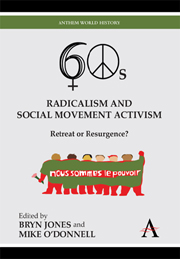Book contents
- Frontmatter
- Contents
- Introduction Sixties Radicalism: Creating Spaces and Leaving Legacies
- PART I Radical Movements Around the World
- PART II Theoretical & Cultural Significance
- PART III Social Movement Legacies
- 10 Sixties Movements, Educational Expansion and Cognitive Mobilisation: Postmaterialist Values and Unconventional Political Participation in West Germany
- 11 Carrying the Flame Forward: Activist Legacies of 1968 in Life Story Reflections
- 12 When the Personal Became Political: A Reappraisal of the Women's Liberation Movement's Radical Idea
- Conclusion
- Notes on Contributors
- Author Index
- Subject Index
10 - Sixties Movements, Educational Expansion and Cognitive Mobilisation: Postmaterialist Values and Unconventional Political Participation in West Germany
from PART III - Social Movement Legacies
Published online by Cambridge University Press: 05 March 2012
- Frontmatter
- Contents
- Introduction Sixties Radicalism: Creating Spaces and Leaving Legacies
- PART I Radical Movements Around the World
- PART II Theoretical & Cultural Significance
- PART III Social Movement Legacies
- 10 Sixties Movements, Educational Expansion and Cognitive Mobilisation: Postmaterialist Values and Unconventional Political Participation in West Germany
- 11 Carrying the Flame Forward: Activist Legacies of 1968 in Life Story Reflections
- 12 When the Personal Became Political: A Reappraisal of the Women's Liberation Movement's Radical Idea
- Conclusion
- Notes on Contributors
- Author Index
- Subject Index
Summary
Introduction
This chapter will focus, from a quantitative and longitudinal perspective, on the cohorts who experienced and were involved in those sixties events often symbolized by reference to the climactic year 1968. It looks in particular at the connection between education and values and unconventional political participation. As education has been a major characteristic of the active sixties generation, educational level and educational expansion will be theorised to analyse social mechanisms behind the sixties movement and its development. We will compare the sixties generation – the birth cohorts 1946–53 at the core – to other earlier and later cohorts regarding their values, and political participation. As there are strong differences between different educational levels, three educational groups will be compared to each other (low educated, intermediate educated and more-highly educated people). As another issue the change in values, orientations and behaviour over time period or age will be analysed for different cohorts and educational levels. To follow the course of development of values and political participation of the sixties generation over time in comparison to other cohorts, longitudinal methods of analysis will be deployed – in particular A-P-C-Analysis (i.e. simultaneous analysis of age, period and cohort effects). The data base used is the German General Social Survey (ALLBUS). To analyse these changes appropriately, we consider a time span of 20 years – beginning with 1986 and ending with 2006.
- Type
- Chapter
- Information
- Sixties Radicalism and Social Movement ActivismRetreat or Resurgence?, pp. 169 - 188Publisher: Anthem PressPrint publication year: 2010



